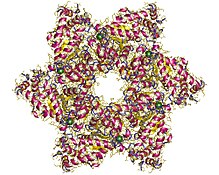| SV40 large T antigen | |||||||
|---|---|---|---|---|---|---|---|
 SV40 T helicase domain hexamer, Simian virus. | |||||||
| Identifiers | |||||||
| Organism | |||||||
| Symbol | ? | ||||||
| UniProt | P03070 | ||||||
| |||||||
SV40 large T antigen (Simian Vacuolating Virus 40 TAg) is a hexamer protein that is a dominant-acting oncoprotein derived from the polyomavirus SV40. TAg is capable of inducing malignant transformation of a variety of cell types. The transforming activity of TAg is due in large part to its perturbation of the retinoblastoma (pRb)[1] and p53 tumor suppressor proteins.[2] In addition, TAg binds to several other cellular factors, including the transcriptional co-activators p300 and CBP, which may contribute to its transformation function.[3] Similar proteins from related viruses are known as large tumor antigen in general.
TAg is a product of an early gene transcribed during viral infection by SV40, and is involved in viral genome replication and regulation of host cell cycle. SV40 is a double-stranded, circular DNA virus belonging to the Polyomaviridae (earlier Papovavirus) family, Orthopolyomavirus genus. Polyomaviruses infect a wide variety of vertebrates and cause solid tumours at multiple sites. SV40 was isolated by Sweet and Maurice Hilleman in 1960 in primary monkey kidney cell cultures being used to grow Sabin OPV.[4]
- ^ DeCaprio JA, Ludlow JW, Figge J, Shew JY, Huang CM, Lee WH, Marsillo E, Paucha E, Livingston DM (15 July 1988). "SV40 large tumor antigen forms a specific complex with the product of the retinoblastoma susceptibility gene". Cell. 54 (2): 275–83. doi:10.1016/0092-8674(88)90559-4. PMID 2839300. S2CID 37600468.
- ^ Ahuja D, Sáenz-Robles MT, Pipas JM (2005). "SV40 large T antigen targets multiple cellular pathways to elicit cellular transformation". Oncogene. 24 (52): 7729–45. doi:10.1038/sj.onc.1209046. PMID 16299533.
- ^ Ali SH, DeCaprio JA (2001). "Cellular transformation by SV40 large T antigen: interaction with host proteins". Semin Cancer Biol 11 (1): 15–23. Archived 2004-01-19 at the Wayback Machine
- ^ Sweet BH, Hilleman MR (November 1960). "The vacuolating virus, S.V. 40". Proc. Soc. Exp. Biol. Med. 105 (2): 420–427. doi:10.3181/00379727-105-26128. PMID 13774265. S2CID 38744505.